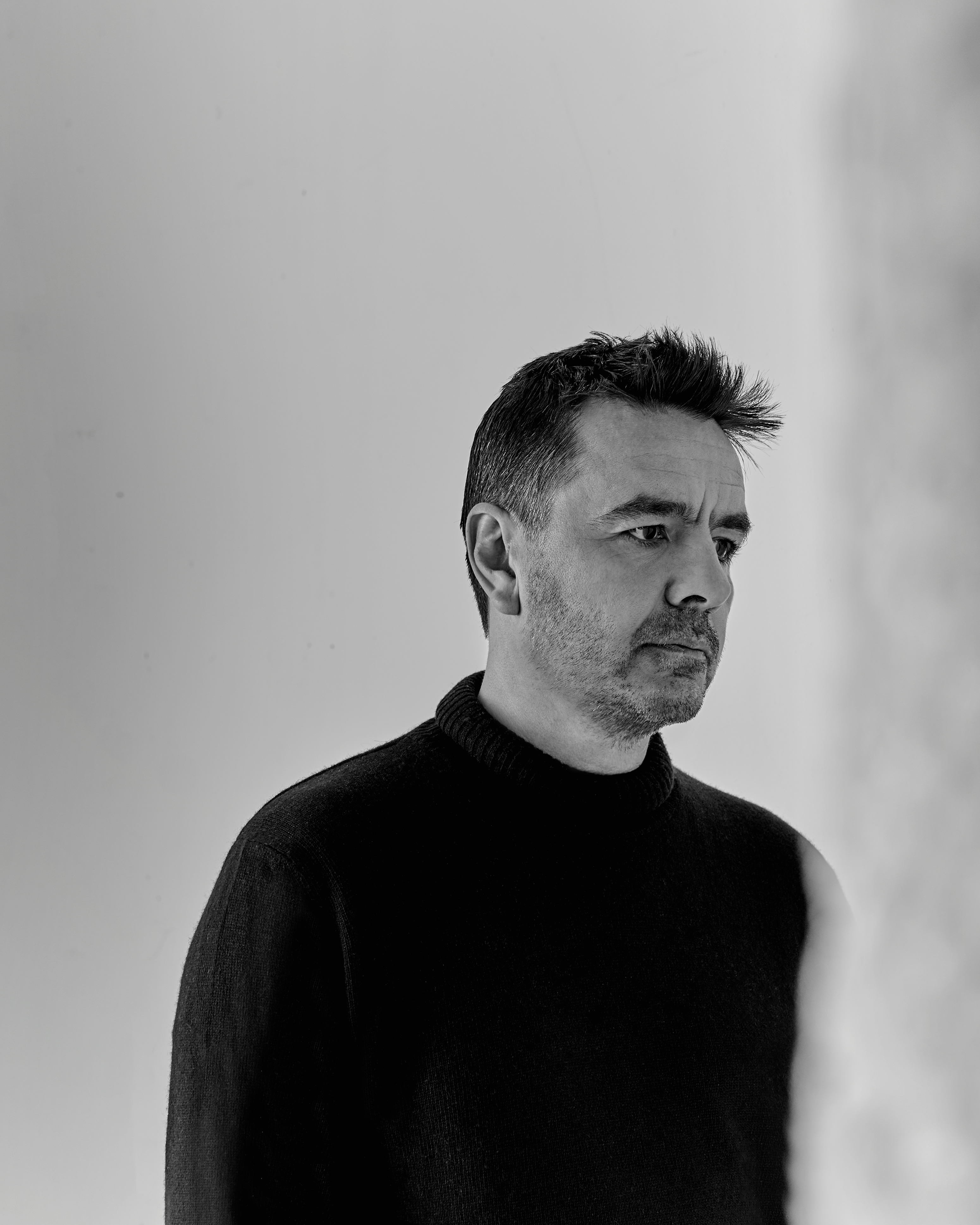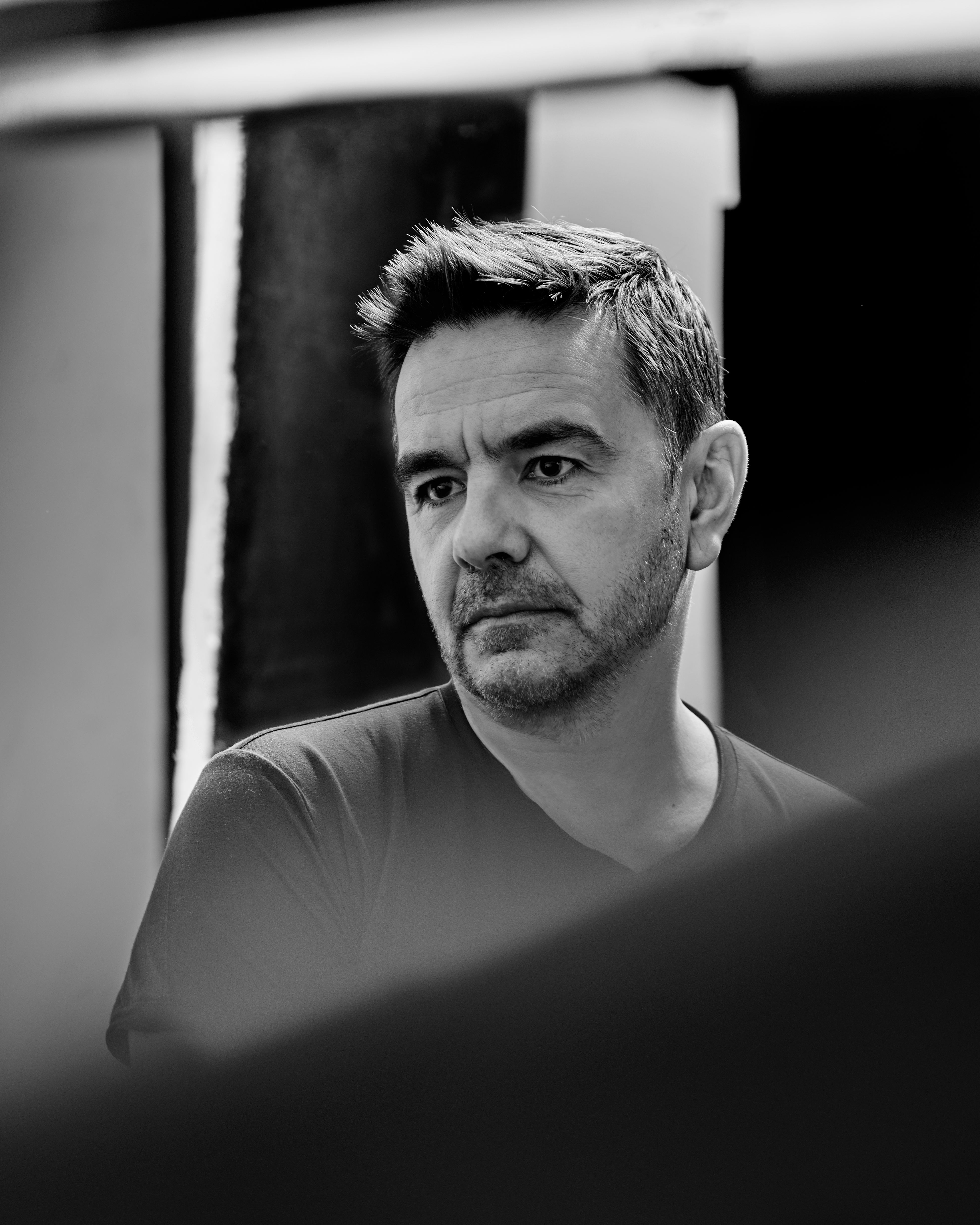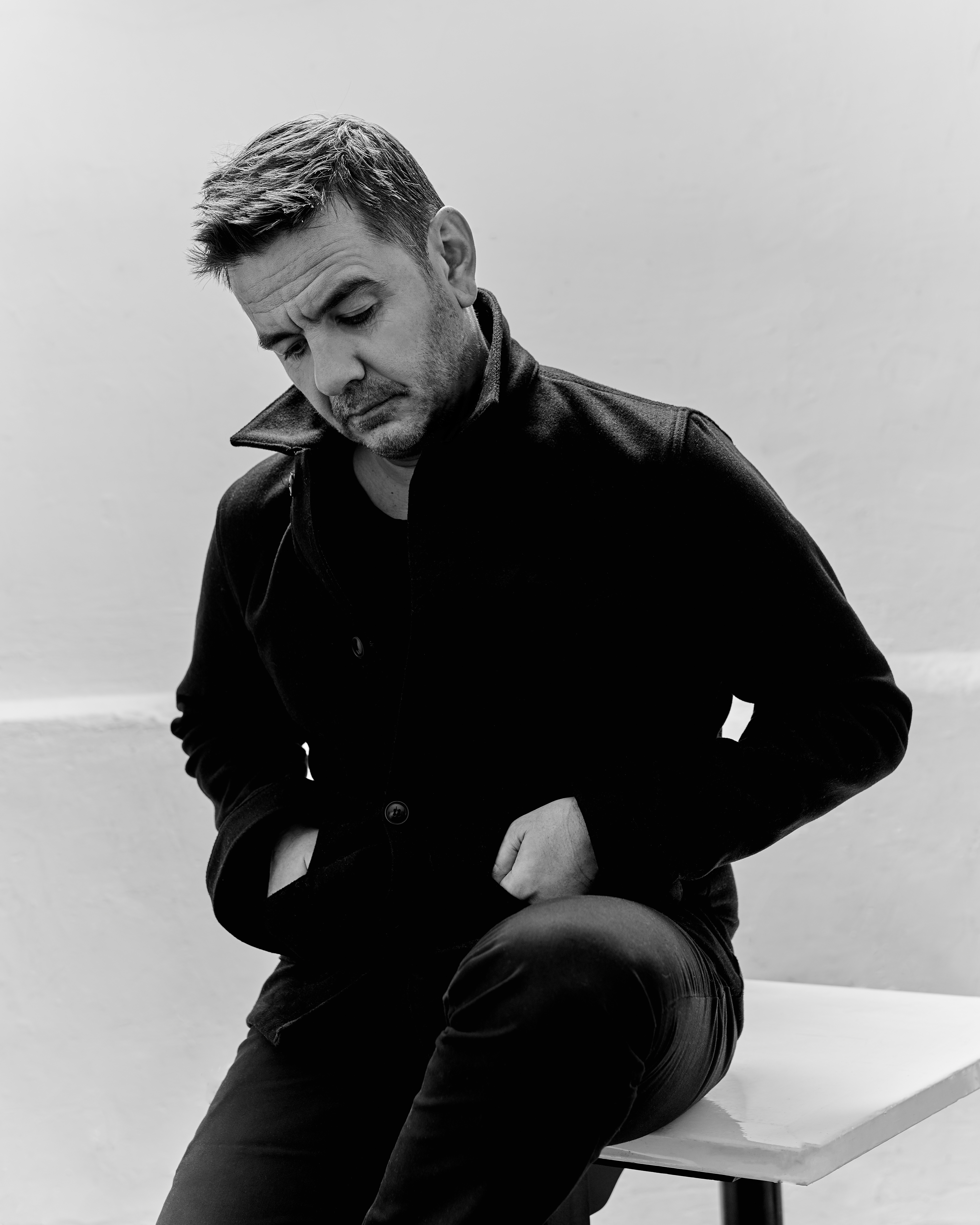Real Talk: Laurent Garnier
Is techno still the music of the future?

Real Talk: Laurent Garnier
Is techno still the music of the future?
Penning an introduction detailing Laurent Garnier’s career risks conceiving a text longer than the Real Talk itself. Having been making the planet dance for over 30 years, Garnier is a man who needs no introduction—but for those few who remain unaware of his extensive and ongoing contributions to dance music culture, we’ll lay out his story (which is conveniently laid out in the Electrochoc book that Garnier and the journalist-writer David Brun-Lambert wrote together, released in 2003, and then updated in 2013, which sold 25,000 copies in France alone.) In no uncertain terms, there are few harder working and more genuine people in dance music; he is a multi-faceted artist whose impact on the music scene is far-reaching; an explorer of old and new sounds who possesses an almost unparalleled knowledge of dance music. You’d have to think hard to find someone better qualified to discuss the evolution of techno and its future relevance.
Hitting the decks in the late ’80s under the DJ Pedro moniker—at Manchester, England’s Haçienda, no less—Garnier experienced first-hand the euphoria of the city’s acid-house movement. From there, he went on to kick off the Wake Up parties at Paris’ Rex Club, helping propel that nightspot into the upper ranks of international clubbing; around this period, too, he got behind the microphone, playing records on Radio FG, Maxximum, Fun Radio, and Radio Nova, where he remained a vital force for 18 years; and, alongside Eric Morand, launched one of house and techno’s most influential labels, F Communications, which released scores of pioneering records from St. Germain, Alexkidd, Mr. Oizo, Jori Hulkkonen, Vince Watson, Garnier himself and many, many others. Among his production catalog are some of dance music’s all-time great tracks, including “Crispy Bacon,” “The Man with the Red Face,” “The Sound of the Big Babou,” and “Acid Eiffel,” the latter two of which were both soundtracks to the explosion of dance music in France. And the list could go on. Aside from his albums and singles, Garnier is also a composer for the cinema, television, and theatre.
DJ, producer, radio host, and composer—there are many ways to describe Garnier, but above all he is a music enthusiast; it is this deep-rooted love for music that has inspired this rich list of endeavours. Still today, with a long and growing list of extraordinary achievements to his name—including being made Chévalier de la Légion d’Honneur in 2017—this appreciation for music still burns as brightly as ever. Over the phone one day from his France home, he talks enthusiastically about the contemporary records that inspire him to continue digging for new music for six hours a day, be it through old vinyl in record shops, checking music blogs, following the most obscure leads on the internet, and listening to every single piece of music he is sent. And then, as the initial conversation reaches a natural close, Garnier went on to explain why he feels that techno music is not the music of tomorrow. This, with a few amendments here and there, is what he had to say.
Next year there will be a big exhibition at the Philharmonie de Paris that aims to tell the history of techno music.
In a time where our music, that was once seen as controversial, is now entering institutions and museums, it seems appropriate to ask ourselves a question: is techno still the music of the future—the music of tomorrow?
For this exhibition, I’ve been invited to be the musical curator. Over the past few months, they’ve compiled the topics the exhibition will cover, and my task is to prepare a short mix to summarize each of the different phases of the techno/electro music story. Each mix is between 25 to 30 minutes long; covering musical genres from Detroit techno, Chicago house, New York garage, Belgium new beat, disco, electronica, UK bass, German techno, and a couple of others. I was supposed to prepare 10 mixes in total.
But, when I submitted all the mixes to the organizer, I felt like we were missing the futuristic side of things—”tomorrow’s music!” I wanted to compile another mix with music that sounds modern, fresh, and forward-thinking. Ninety-nine percent of the music I selected for this last mix was brand new; some tracks are not even released yet, but I also wanted to include an old track from Jeff Mills and to finish the mix with “Big City Sky,” a track Derrick May did a long time ago with System 7. This track is amazingly futuristic and if you didn’t know that it was produced over 20 years ago, you would feel like it was done yesterday.
What’s funny is that I also started the whole process of making these different mixes with a Derrick May track. The first mix I worked on was the “Detroit mix” (as that’s where it all started for techno) and I opened it with a track Derrick did under the alias Longer Than Long Ago. So closing the very last mix with a Derrick May track felt like a great way to close the loop.
Although Derrick hasn’t released new music for over 20 years, we can easily notice that his music still sounds more futuristic and more about tomorrow than a lot of the stuff that is actually being made today. So, I asked myself: was the most innovative form of techno music made 20 years ago? The more I thought along these lines, the more I wondered whether techno is actually still the music of the future at all.

To explore this question, let me explain what I mean by “techno.” For me, techno music is like a huge record bag filled with many different sub-genres. From ambient/electronica to all the many styles of house and techno to breakbeat (even some drum & bass), all the way through to the most extreme gabba. Within techno is an ever-expanding amount of variants and offshoots (not just your standard ‘4 on the floor’.) Over the last 30 years, since the birth of techno in Detroit, we’ve heard it all, from the noisiest, most abstract types of techno to its most minimal breeds; the deepest to the strangest; the most classically musical to the wildest abstractions. Put simply, techno has grown to encompass almost anything possible.
Nowadays, a lot of the techno tracks that we could qualify as modern and futuristic are mostly produced in France, Belgium, Germany or Holland. Music released by labels such as Skryptöm, Ilian Tape, Clone, Token, Phantasy or Unknown to the Unknown, just to name a few. The music they put out is amazing. It’s often atmospheric, sometimes dark and moody, and usually nods to futuristic themes of space travel or the unknown.
It’s funny because I’ve always used my own musical shorthand to summarize the new music I put in my record box for my DJ sets. I write things like “another chord ride” or “shake my hips,” but when it comes to this more upfront stuff, like that above, I use a lot of space references like “Starship enterprise music” or “Entering deeper Space.” These are the same phrases that I was using on Jeff Mills’ early Axis records 25 years ago. Jeff’s music had a huge impact on the new generation of producers, his music is obviously one of the main inspirations for all this modern type of spacey sounding music.
But even though these new tracks feel very futuristic it could also just be an illusion. Listening to Derrick’s and also Jeff’s track on this final mix really made me realize that some of the most futuristic sounding techno music was actually produced a very long time ago.
So is all this “modern-sounding” music still the music of tomorrow? I guess the honest answer is “perhaps not”.

I don’t want to stand here and say that everything that can be done with the artform already has been. I don’t know if that’s the case; nobody really does. And I would sound very blasé if I said this. But when you look at the history of modern music, over the last 80 years music has always reinvented itself and offered something fundamentally new within a pretty short period of time, no more than 10 to 15 years. If you look at the history of jazz, funk, rock, hip-hop or even some newer genres/sub-genres of music, you’ll see that at some point the music stopped moving forward because it had experimented with nearly everything within those set parameters.
As inclusive and expansive a term as techno is, I think it might also be at that point today, and, what’s more, I think it might have been there for some time. It’s not exactly a crisis, as there are still tons of exciting underground techno records coming out every month, but it feels like we’re in a similar situation to jazz when Miles Davis and John Coltrane died. Around that period, a lot of people said that jazz was just going to go round in circles. I think with the free jazz movement in the ‘70s, musicians experimented so much that they might have pushed jazz as far as it could go. Jazz still exists today, and there are many brilliant jazz artists, but what we are hearing in jazz today no longer qualifies as ground-breaking.

Techno was the last real musical revolution of the 20th century (a few years after hip-hop), but we’re already in 2018 and this revolution now belongs to the last century. And since this revolution—since the arrival of techno music 30 years ago—nothing totally new has taken over, sweeping away all that had come before like techno did in 1987/1988. If you look at what teenagers are listening to nowadays (including my son, who is 14 years old)—trap and grime, which clearly belongs to the hip-hop world; techno; pop/rock—all of it belongs to the last century, before they were even born. It’s so strange to me that the 20 years olds of today have no other choices than to listen to musical genres that belong to their parents’ generation.
This brings with it a certain irony. Techno was always about “the future,” about looking forward. We were also making music with computers, which were in themselves a symbol of the future. The music was about bringing the future into our lives and seeing what we could do with technology. Nowadays, some techno DJs are even refusing the future; making a stand to play on vinyl to an almost fetishized extreme. While I understand and respect the political sentiment behind this approach, I can’t help thinking this is a misunderstanding of what techno is all about.
I think this change also has a generational aspect to it. If you’re a 20-year-old techno DJ today, you’re in a scene that has a very long history; and understandably, some of this history just doesn’t feel relevant. With all the over-exposure of our lives in social media, it must be impossible for a teenager now to understand the idea of faceless techno!
But, at the same time, this could also be a source of frustration. I was born in ‘66, and when I was 14 or 15, I felt sad that I had never lived the “swinging ’60s.” I had this big sense of nostalgia; I would have loved to have lived it. But because I am part of a generation where new styles of music were cropping up every five years, I didn’t really have much time to look backwards. As a kid it was all about disco and funk; then punk; after that reggae, new wave, and ska arrived; and then hip-hop came from New York and electro from Miami. A short few years later, house and techno came into my life. All of this happened in a span of only 20 years! So I can definitely understand that someone who is 20 today must feel a bit frustrated to know that the bulk of the history of the music he loves belongs to a much older generation.
Nonetheless, I’d like to be very clear at this point to say that I am definitely not saying that techno music has become boring, nor that there isn’t good music being made anymore. If this music was boring for me, I would have stopped a very long time ago. I spend about six hours a day searching for music, and I still discover and enjoy a lot of what I hear. Techno has always been “my music,” and I still love it to death. Today’s underground scene still makes sense and so many new labels and artists are still making exceptional music. Techno has never been so alive.
But while I am always finding new records that I am excited to play, while so many artists are coming up with interesting ideas and making music that sounds futuristic and fresh, we can’t really say anymore that the music we are hearing is fundamentally breaking new barriers.
Like the idea behind Jeff Mills’ EP Cycle 30, after 30 years techno is now feeding itself from its own roots, and the music changes fast. In France, hard techno is becoming trendy again, whereas only a few years ago, it was all about the Chicago booty sound and New York house. Music goes in cycles and these “new” sounds aren’t that different from what labels were doing in the past. It’s still great music, but it’s not a reinvention of the wheel.
Or look at it like this. Take someone like Aphex Twin: if you listen to Richard’s very prolific music, how the hell can you break more barriers than that? The guy is on another level. He experimented so much. He was a complete freak about his instruments. He was actually opening his machines and modifying them himself. He didn’t accept that this machine makes 100 sounds; he was thinking fuck that, I am going to make it make 1,000 sounds. That’s why he was so forward thinking. Remember “Windowlicker?” It was produced in 1999, that’s 19 years ago! It’s hard to think of anyone today who is bringing something that radically different and futuristic.

So have we in the last 30 years heard everything that techno music can offer? Is there anything more that can be done to deeply change the direction? Have we exhausted the subject?
And if there’s no longer room for innovation in techno, why is it still such a powerful force when so many other genres have faded out?
I think a lot of musical revolutions were inspired by frustration. If you look back at the birth of many major musical movements, a lot of them were triggered by social or political actions/reactions; jazz was the music of freedom, a way for African American musicians to express themselves and exist in their own country. Artists made techno music in Detroit as a means of surviving, existing in a community and feeding their families. We forget that sometimes. For them it was a means of survival rather than a means of entertainment. Chicago house music was born in black gay clubs, born out of a repression. It was very fertile for something new to happen. Rock & roll was a movement of the kids who were rebelling against their parents’ generation. Rave music took over the UK in the late ‘80s partly because in England people had had enough of Margaret Thatcher, joblessness, and police repression; it was not an easy time in England, and this made a fertile ground for something new to happen. Punk was the same: a reaction against something, as was hip-hop.
Unfortunately a lot of the music world today seems pretty passive and has switched to a pure form of entertainment; also I think a lot of our fights have been won. Back in those days, while our music was partly about hedonism, we were also constantly fighting for (or against) something. Also, the fascination for the “future” and “outer space” was definitely a big inspiration for early techno producers, this is why Detroit techno was so futuristic from day one. Perhaps it’s this forward way of thinking that kept techno alive for longer than expected?
It is obvious that there is no longer a political basis in a lot of today’s music; also the fascination for space and the great unknown seems like something from the past (aren’t we supposed to have colonized new planets by now?), so we must hope that new generations will find new battles, new ideas, new obsessions in order to shape the real music of tomorrow.
But I think techno has been “tomorrow’s music” for so long, and it’s surely only a matter of time before a new revolution comes to start a new fight; and most importantly this will bring something that belongs to the new generation. I still believe there is a lot for them to fight for.

Before we finish, I’d like to point out a very positive thing that is quite different from the situation in the late ‘80s. There is so much great music coming out from everywhere these days that at least we can’t feel frustrated music-wise, unless you’ve gone deaf!
This wasn’t the case back then: when house music arrived, other music had become so boring. Besides the fact that hip-hop was starting its mutation towards gangster rap (it was getting more radical), everything else was getting very dull. Funk became very commercial, punk wasn’t going anywhere, new wave had lost all it’s radicalness, and we’d heard disco for many years already. There was a real need for something fresh to happen.
A music that has been experimenting for over three decades can hardly reinvent itself, but the good thing is that there’s never been so many great producers and so much good music around. This is partly because it’s easier to make and distribute music than ever before.
I am convinced that one of these days, someone, somewhere will make something as innovative as Derrick and Jeff did years ago. Then the kids will go mental about it and it will sweep away everything else as it did in the UK back in ‘88. And this will be the new music of the future.
We’re not quite there yet, though I can’t wait to hear it. And in the meantime there’s still 30-years worth of incredible forward, inward, and upward looking tunes to listen to and dance to. After all, techno might not be the music of the future any more, but luckily for all of us, it’s most definitely the music of today.
All photos: Denis Boulze
Laurent Garnier will perform at this year’s Polaris Festival, taking place from November 29 to December 2 in Verbier, Switzerland. Also on the bill are Jeff Mills, Massive Attack, Nina Kraviz, and more. Information can be found here.

